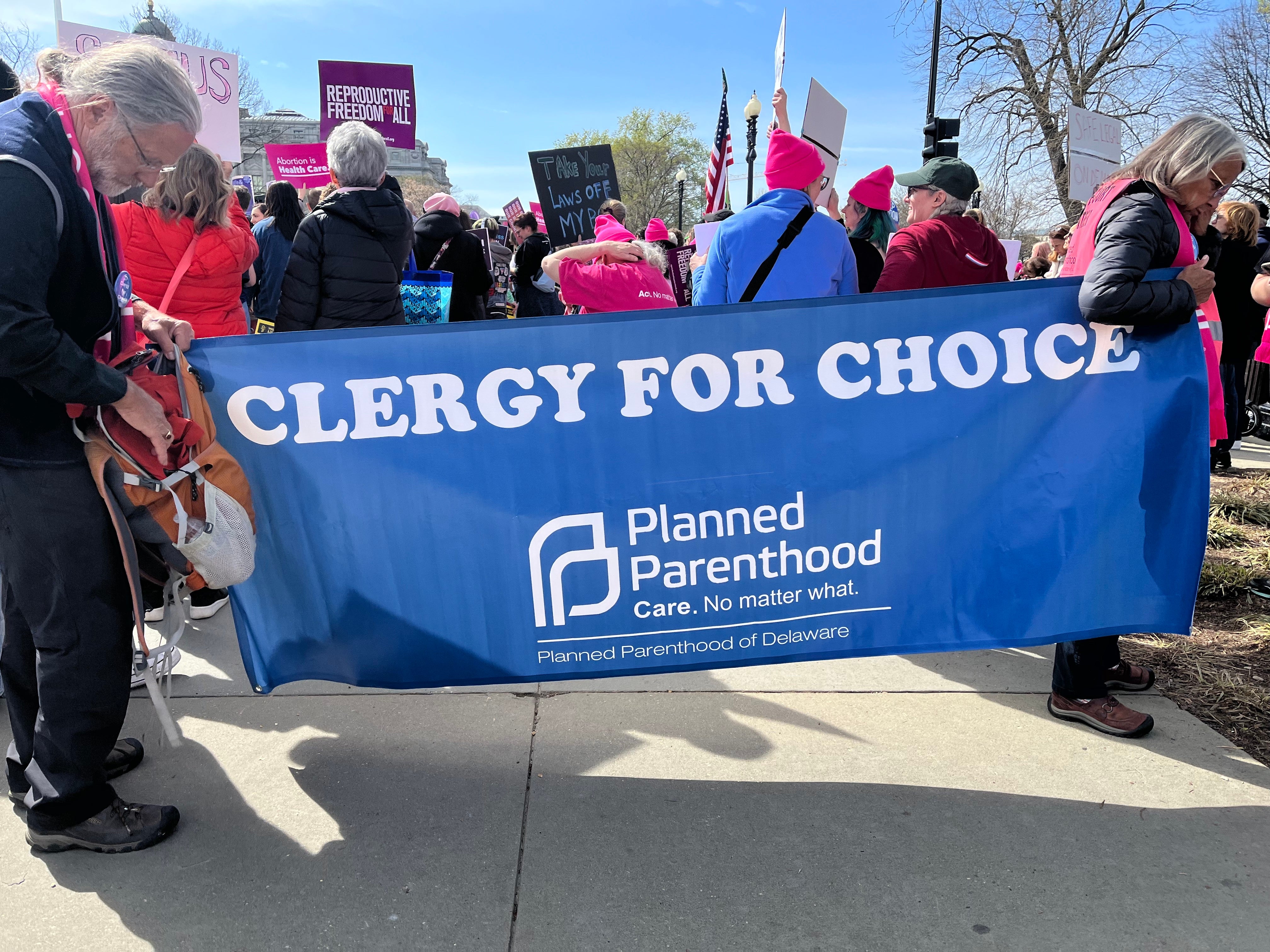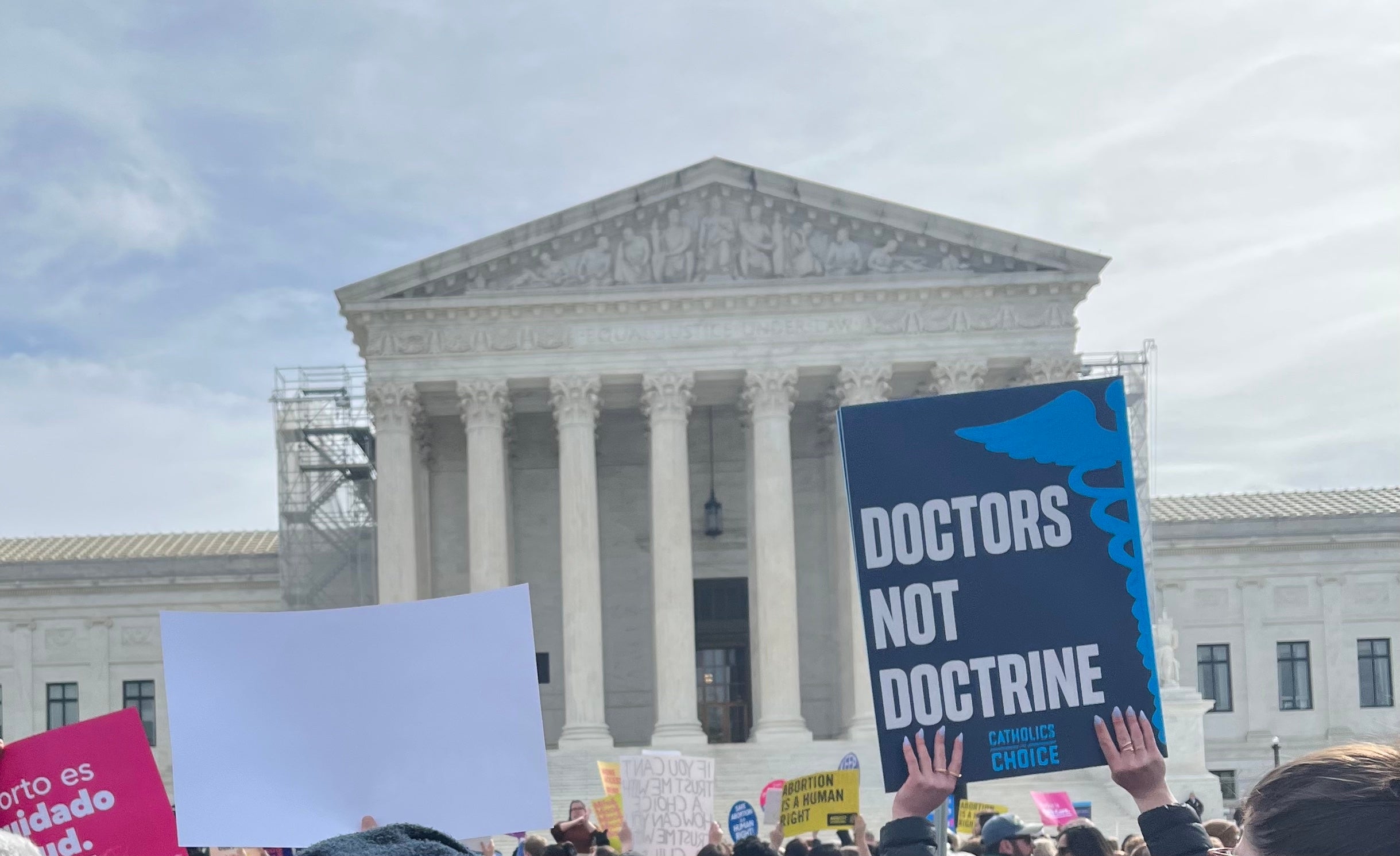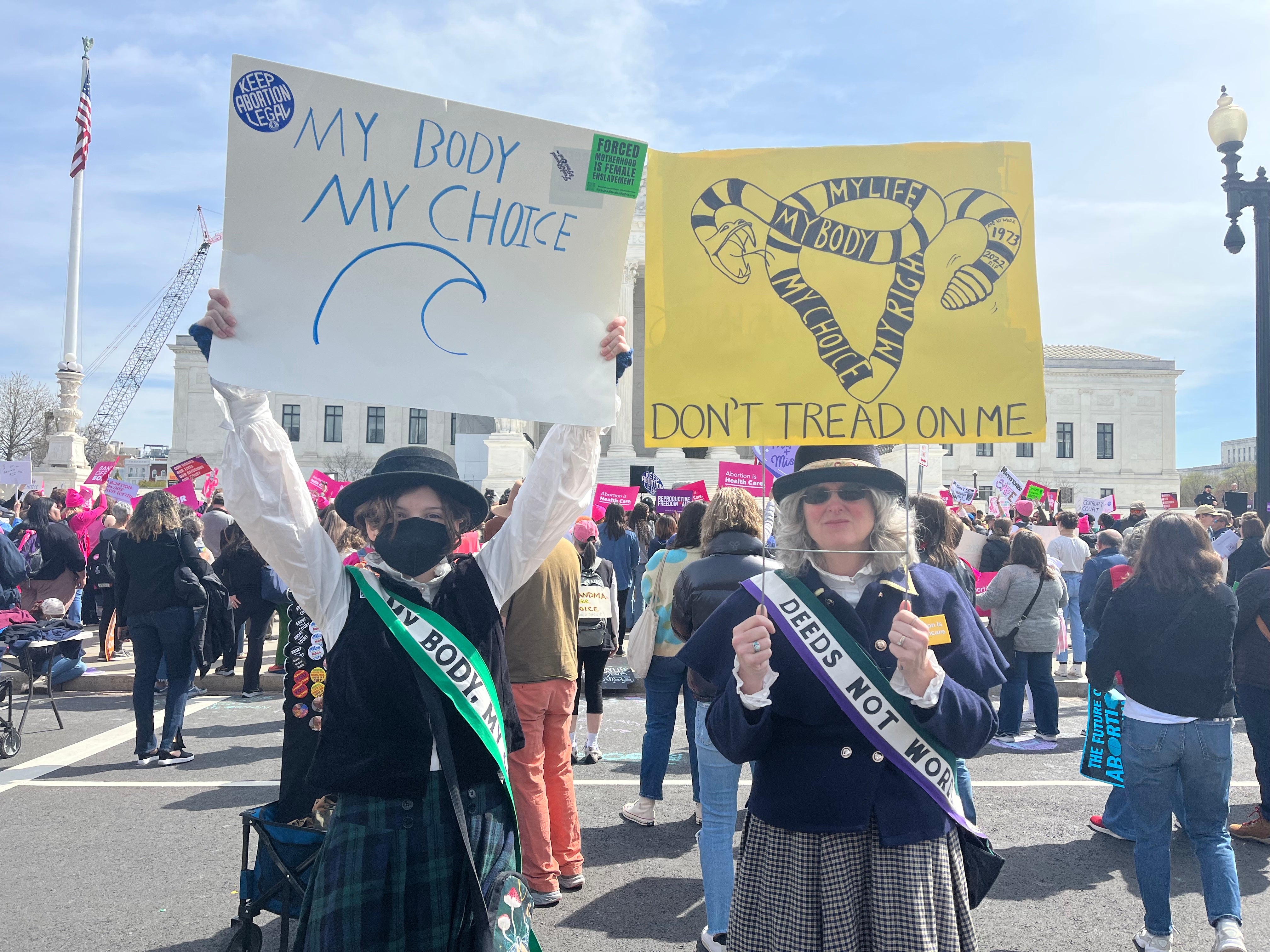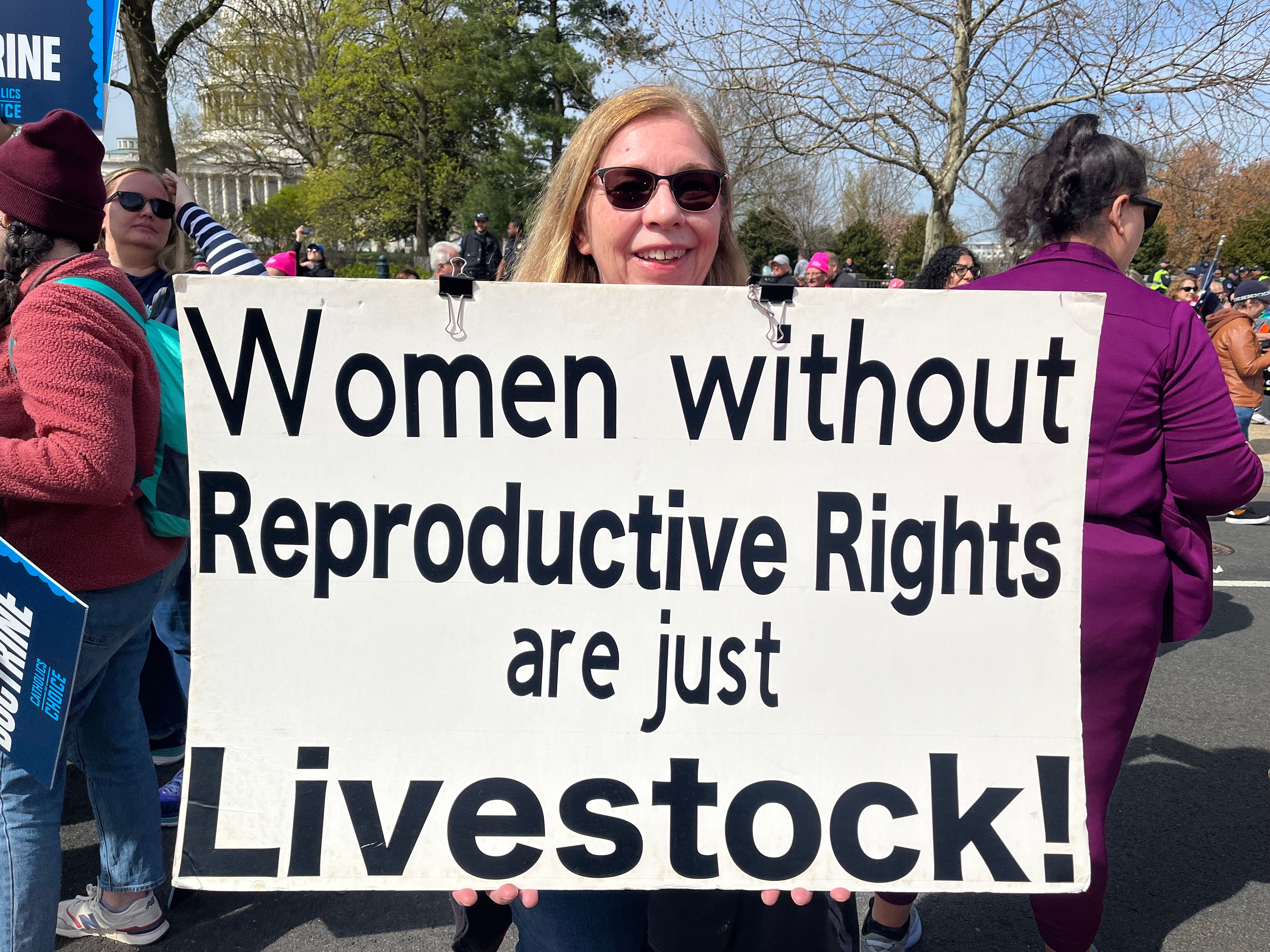Robots, suffragettes and pro-choice Catholics: Meet the mifepristone ban protesters outside the Supreme Court
As the country’s highest court weighs whether to overturn the approval of widespread abortion medication, pro-choice religious advocates and medical professionals alike are protesting restrictions on reproductive healthcare, Katie Hawkinson reports
Catholics for Choice President Jamie Manson arrived on the steps of the US Supreme Court with one goal in mind: To fight against religiously motivated restrictions on reproductive healthcare in the United States.
“There has been a very concerted effort by Catholics…to pack this Court with justices who are opposed to abortion because of their faith,” she told The Independent.
Ms Manson spoke to The Independent on Tuesday morning as the court heard oral arguments in a case that could overturn the federal government’s approval of the abortion drug mifepristone. The plaintiffs argue that the US Food and Drug Administration (FDA) wrongfully approved mifepristone for use up to 10 weeks of pregnancy, and then improperly eliminated requirements that the drug should only be dispensed in person.
Thousands of people, from both the Washington, DC metro area and beyond, flocked to the steps of the nation’s highest court to advocate for accessible reproductive healthcare and speak out against the anti-abortion activists who brought the case forward.

Ms Manson was joined by Kate Hoeting, writer and managing editor of Catholics for Choice and an abortion doula who provides physical and emotional support for women who receive abortions.
“Being an abortion doula moulded me into a woman of faith,” Ms Hoeting told The Independent. “I didn’t use to be religious at all”
For Ms Hoeting, her faith is inextricably intertwined with her activism — and she hopes to fight the “religious extremism” that she says propelled the case to the Supreme Court.
She is not alone. From doctors, women dressed as suffragettes and mifepristone-carrying robots, thousands are calling for the Supreme Court to reject what they call a misinformation-fuelled push to revoke approval of a medication abortion resource that has been available for 22 years.
Organisers, attendees alike denounce ‘religious extremism’
A 2022 poll by The Associated Press-NORC Center for Public Affairs Research indicated that 63 per cent of American Catholics say abortion should be legal in all or many cases. But despite this majority opinion, Ms Manson said that her own church has pushed to codify its theology in US law, noting that every Justice who struck down Roe v Wade in 2022 — which guaranteed the right to an abortion in the US — was raised Catholic.

“It’s my church that is operating in legislatures, in the courts, to try and push forward an agenda, a theological idea about when life begins,” Ms Manson said. “These are religious ideas, they should not be codified into civil law, because they take away human rights when they do that.”
Ms Hoeting agreed: “A small group of religious extremists who are trying to put their theological views on the rest of the country.”
The FDA first approved mifepristone in 2000. The drug came under fire in November 2022, when the Alliance Defending Freedom — a Christian law firm that has long claimed that abortion denies babies the “right to life” — filed a federal lawsuit targeting mifepristone from Amarillo, Texas on behalf of a group of anti-abortion physicians incorporated as the Alliance for Hippocratic Medicine, which was organised that same month with an address in Amarillo.
A US district judge appointed by former president Donald Trump later ruled to suspend the FDA’s approval of the drug, triggering appeals that were kicked up to the nation’s highest court.
Jessica Ellsworth, an attorney representing Mifeprex manufacturer Danco Laboratories, said the judge’s decision relied on debunked and retracted medical studies, pointing out hundreds of pages of research and clinical studies that have proven its safety and effectiveness, The Independent previously reported.
Throughout the crowd, abortion rights advocates held signs decrying the push against medication abortions.
“Doctors not doctrine,” signs held by members of Catholics for Choice read. Meanwhile, volunteers with Planned Parenthood of Delaware held a banner that read, “clergy for choice.”
Amid the sea of signs, one woman stood out among the crowd: Dressed in the sash, hat and outfit of a twentieth-century suffragette, Darcy Nair held a sign that read, “Don’t tread on me.” Having attended women’s rallies and abortion rights events in her historic garb since 2017, Ms Nair told The Independent she attends these events to push back against the “religious right.”

“This is just about controlling women,” Ms Nair told The Independent. “It’s a basic human right, and I absolutely disagree with the way that the religious right is chipping away at it.”
“They’ve been chipping away at the ability of reproductive health clinics to operate…being able to have a medication abortion is more important than ever because it’s access for people who live in places where you have to drive 100 miles to reach a reproductive health clinic,” she continued.
In the wake of the Dobbs v Jackson decision, twenty-one states currently restrict or ban abortions, leaving women no choice but to leave their states and travel to obtain reproductive healthcare.
Medical students and seasoned physicians alike are concerned about medical disinformation
As many attendees voiced their concerns about religion’s role in limiting abortion access, physicians told The Independent that medical misinformation about medication abortions is running rampant.
Dr Cheryl Hamlin, who previously worked at Mississippi’s only abortion clinic, donned her white coat for Tuesday’s rally and told The Independent she’s concerned about the medical misinformation that anti-abortion advocates are spreading.
“Mifepristone has essentially no side effects unrelated to the process that it is treating,” she told The Independent.
One of the concerns that anti-mifepristone advocates have is the supposed negative impacts of the medication. Felipe Avila, communications director for the National Association of Pro-Life Nurses, said his organization is “deeply concerned by the harmful effects of chemical abortion.”
“We’d like to see the Supreme Court step in and bring back some of those common-sense limits on medication abortion,” he told The Independent.
However, Dr Hamlin emphasized that the medication is safe and effective.
“Yes, occasionally it fails or people have heavy bleeding with the medication abortion process, but it’s very infrequent and way less, for example, childbirth.” She noted that it also can help treat miscarriages and other nonviable pregnancies.

Dr Hamlin told The Independent that she attended the rally because misinformation about reproductive healthcare can result in higher-risk abortions.
“Having worked in Jackson [Mississippi], I saw what restrictions in the name of safety do…people show up at later gestational stages and it makes abortions less safe,” she said, noting she now works in Massachusetts and sees many people who travel from their home states where abortion access is heavily restricted.
Dr Hamlin isn’t alone in her fight. Sarah McNeilly, a student at the Albert Einstein College of Medicine working towards her MD, told The Independent she attended the rally for the sake of her future patients.
“As a future doctor and future OBGYN, I want to be in a position where my patient and I are empowered to jointly make the decision that’s best for them, whether that’s continuing the pregnancy or terminating through abortion, whichever is best for them.”
She came with aidaccess.org, an organisation that sends abortion medication to patients in all fifty US states. Ms McNeilly and her fellow organizers brought an unexpected guest — a small robot that can connect patients with telehealth providers who consult on reproductive healthcare.

What happens next?
As the oral arguments came to a close, it became clear the Supreme Court despite previously overturning Roe v Wade may not rule to rescind the approval of mifepristone. A majority of justices on the nine-member court were sceptical that a group of anti-abortion doctors had sufficient legal grounds to bring the case against the FDA.
However, conservative justices Clarence Thomas and Samuel Alito floated the idea of using a 150-year-old law to justify rescinding the FDA approval, The Independent previously reported.
The Court now has until the end of June to issue a decision in the case, leaving advocates on both sides in limbo for the next several weeks.
Join our commenting forum
Join thought-provoking conversations, follow other Independent readers and see their replies
Comments
Bookmark popover
Removed from bookmarks